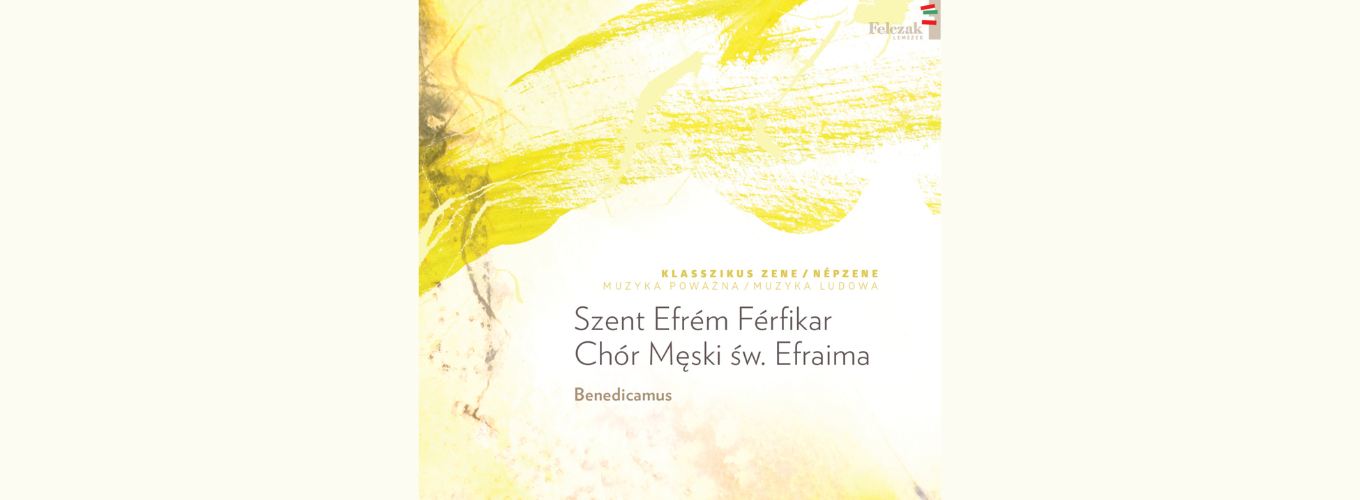
Szent Efrém Men's Chorus: Benedicamus
Szent Efrém Men’s Chorus, established in 2002 is one of Hungary’s most well-known vocal ensembles. Szent Efrém Men’s Chorus is dedicated to continuing the Hungarian men’s chorus tradition and performance of contemporary choral music. They host the Orientale Lumen series. Their director, Bubnó Tamás is a Liszt Award winner and has been named a Hungarian ‘Artist of Excellence’. The chorus is a conscious advocate for the universal language of music, cultural diversity and enrichment of international cultural connections. Their success abroad began in Poland and the material they present there regularly reflects their three-sided mission: research and presentation of the vocal heritage of the Christian world, fostering the Hungarian men’s chorus tradition and popularizing contemporary vocal music. All three directions show that the time is right for this recording of Hungarian and Polish choral music.
The friendship between Hungary and Poland, the mutual affection, respect, ethic of lending each other a helping hand - have been going on for centuries. Today we continue to feel and experience this. Poland has become an extremely important place for Szent Efrém Men’s Chorus: their first performance abroad was in Poland (2003), they won an important award there (2006). In 2018 they will perform there for the 12th time.
This record presents an area of Polish and Hungarian music that is barely known to the greater public. Compositions of an extremely high standard and quality by great classical masters of the two nations: Polish composers - Lutosławski, Penderecki and Twardowski; and men’s choral works by Hungarian composers Liszt, Kodály and Bartók. There are four sacred works on the program. Franz Liszt’s “Psalm 129” from his “Szent Szaniszló Oratory” (De profundis –
A mélységekből kiáltok hozzád. ..) written in his old age about the great Polish saint. Krzysztof Penderecki’s psalm-motett “Benedicamus Domino” based on a melody from the Middle Ages. And two works by Romuald Twardowski in Polish: the “Our father” and the 134th Psalm ( Íme, most áldjátok az Urat, Ti az Úr minden szolgái ) – both masterpieces of Polish sacred music.
The five secular compositions on the record are based on Polish and Hungarian folk music sources. For his men’s choral piece (1937), Kodály used one of the most well known Hungarian folk melodies and a famous poem by Endre Ady – both called: “ Felszállott a páva ”. Two years later he finished his symphonic work on the same melody “ Páva-variációk ” which became popular world-wide.
The other Kodály piece is the master’s most popular choral work which is sung in 36 languages the world over: a weary wanderer’s prayer as he goes to rest “Esti dal”. We also hear six folk songs from the rarely-heard varied and musically colorful cycle of ten Polish military songs for men’s chorus by Witold Lutosławski (completed in 1951). Béla Bartók composed a total of six works for men’s chorus, two of which we hear sung by Szent Efrém Men’s Chorus: the 1926 version of “ Négy régi magyar népda l” [“Four Old Hungarian Folk Songs”]; and one of his most brilliant vocal works of the 20th century in three movements “ Elmult időkből ” [“From Olden Times”] from 1936 - a soul-stirring picture of the life, sufferings and joys of a person who works the land. This was the last piece Bartók wrote for male chorus.
1. Zoltán Kodály (1882–1967) | Fölszállott a páva / Wzleciał paw, na podstawie wiersza
Endre Adyego
2. Romuald Twardowski (1930) | Otcze nasz / Ojcze nasz
3. Romuald Twardowski (1930) | Sie nynie / Oto błogosławcie Pana (psalm 134)
4. Ferenc Liszt (1811–1886) | De profundis (psalm 129)
Z udziałem: Béla Laborfalvi Soós – śpiew, Domonkos Farkas – organy
5. Krzysztof Penderecki (1933) | Benedicamus Domino
6. Lőrinc, Márk i Tamás Bubnó | Harang interludium / Interludium na dzwony
7–10 Béla Bartók (1881-1945) | Elmúlt időkből / Z dawnych czasów
7. Nincs boldogtalanabb a parasztembernél / Nie ma nieszczęśliwszego człowieka niż chłop
8. Egy, kettő, három, négy, hát te pajtás, hova mégy? / Raz, dwa, trzy, cztery, dokąd się druhu wybierasz?
9. Nincsen szerencsésebb a parasztembernél / Nie ma szczęśliwszego człowieka niż chłop
10. Márk Bubnó | Harang interludium / Interludium na dzwony
11. Zoltán Kodály | Esti dal / Pieśń wieczorna
12–17. Witold Lutosławski (1913–1994) | Dziesięć polskich pieśni ludowych na tematy żołnierskie
– wybrane utwory
12. Pod Krakowem czarna rola
13. Zachodzi słoneczko
14. Gdzie to jedziesz, Jasiu
15. Jam kalinkę łamała
16. Już to mija siódmy roczek
17. Małgorzatka
18. Béla Bartók | Négy régi magyar népdal (1926-os verzió) / Cztery dawne węgierskie
pieśni ludowe wersja z 1926 r.
• Rég megmondtam bús gerlice / Dawno mówiłem, smutna turkaweczko
• Jaj Istenem, kire várok / Mój Boże, dlaczego jeszcze czekam
• Ángyomasszony / Szwagierka
• Béreslegény / Parobek
SZENT EFRÉM FÉRFIKAR / SZENT EFRÉM Men’s Chorus :
Nagy Bertalan, Pechan Kornél, Oláh Marcell, Balázs Edgár,
Bubnó Lőrinc, Orbán Domonkos, Tóth Péter, Bubnó Márk
KÖZREMŰKÖDIK /With guests:
Laborfalvi Soós Béla – ének / voice
Farkas Domonkos – orgona/ organ
Recorded at the Budapest-Soroksár Reform Church in 2018.
The “Felczak records” released in 2017/2018 have been co-produced by Fonó Music Hall and Philidor Institute (international agent)
Zenei rendező/Music director: Osváth Zoltán
Hangmérnök/Sound engineer: Kádár Mihály
Mastering: Kádár Mihály, Kiss Gergely Ábel (soundwork.hu)
Borítóterv/Cover design: Kálmán Luca
Fotó/Photo: Birtalan Zsolt, Orbán Domonkos
Sorozatszerkesztő-producer/Series producers: Horváth László, Rosonsczy-Kovács Mihály
Támogató/Sponsor: Emberi Erőforrások Minisztériuma (Hungarian Human Resources Ministry)

